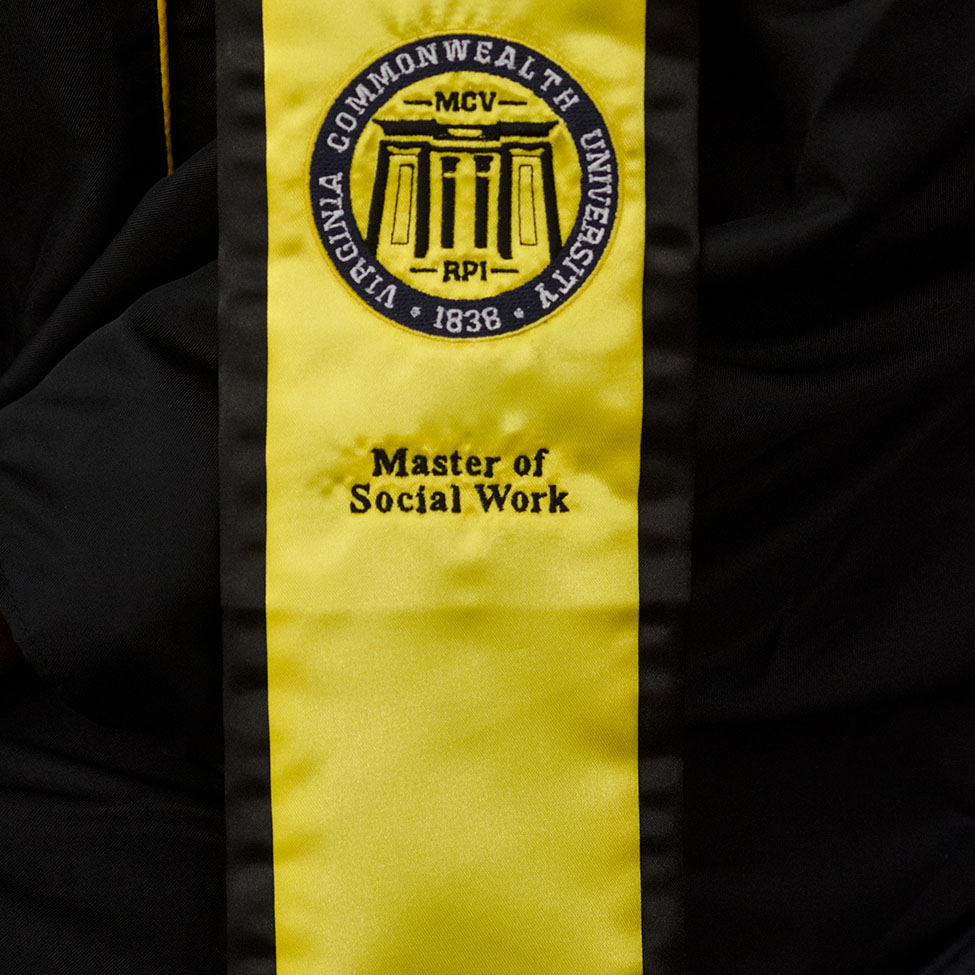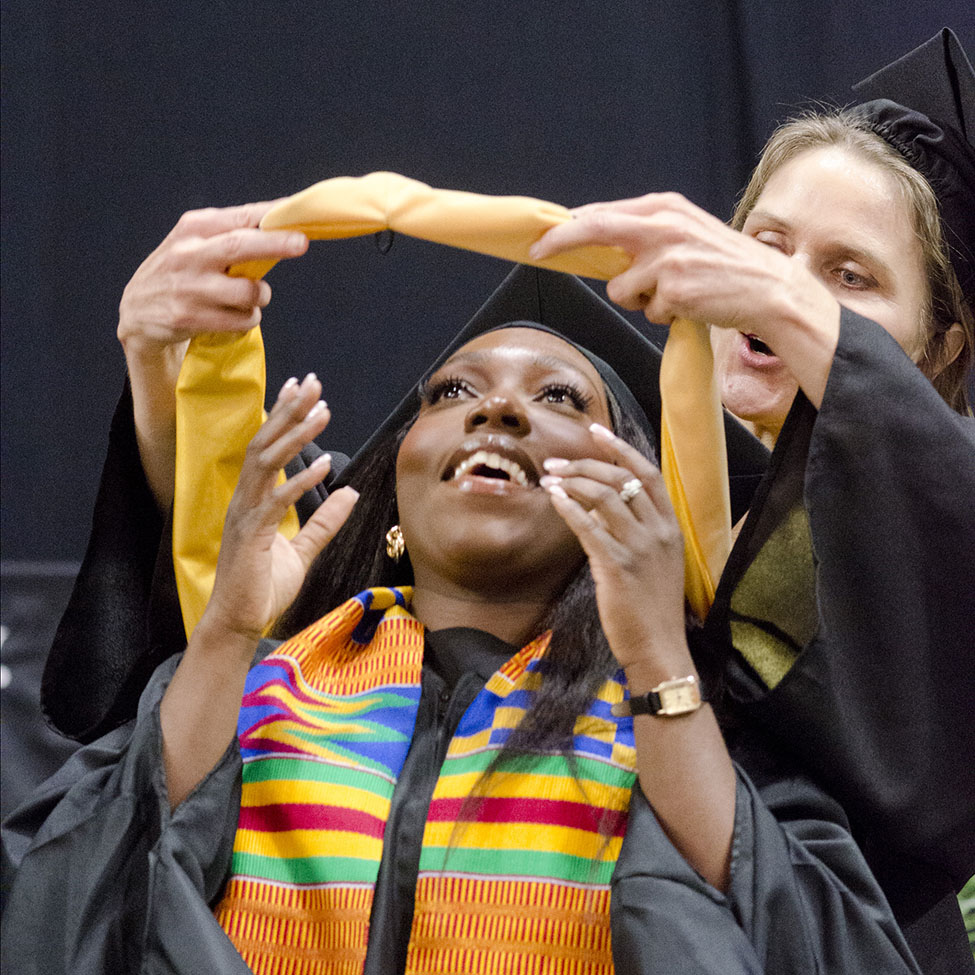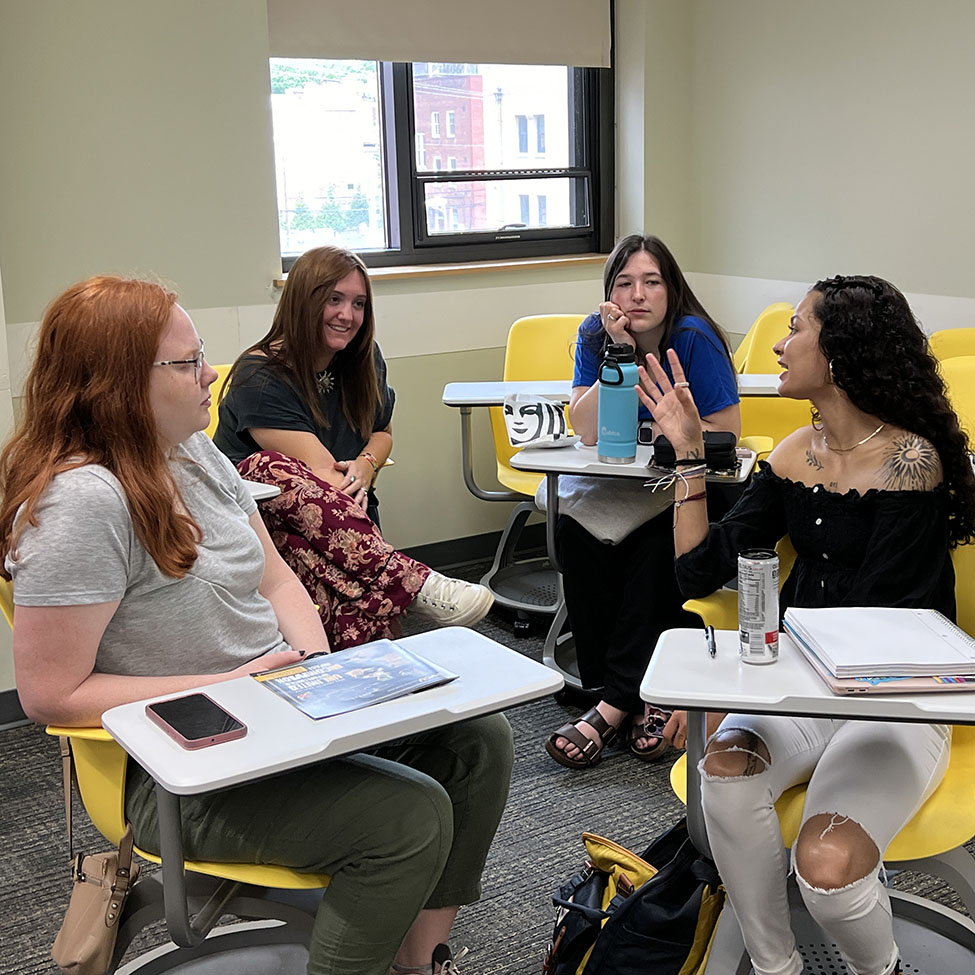Master of Social Work
Specialized coursework, field education and experiential learning prepare our students as clinical or macro practitioners who go on to serve individuals, families and communities, and to effect systems-level change through policy and advocacy.
Guided by the principles of social justice, human rights, cultural competence and ethical practice, our Master of Social Work Program equips students with the skills to serve as advanced practitioners, policymakers, advisors and researchers capable of creating meaningful and lasting change in their communities.
Students in our program learn to:
- Apply ethical values and principles
- Counteract individual and institutional prejudice, oppression and discrimination
- Analyze and evaluate professional practice, programs and service delivery systems
- Advocate to effect social and economic justice
Explore program details
The primary goals of the M.S.W. Program are to provide:
- Generalist knowledge, skills, ethics and values essential for work with individuals, families, groups, communities and organizations
- A program that prepares students for work in areas of specialization in either clinical social work practice or macro social work practice (*disclaimer) in a range of settings
- An educational environment where students:
- Apply the profession’s values and ethical principles
- Gain a greater understanding of implications of diversity through education on identifying cultural strengths and ways to counteract individual and institutional prejudice, oppression and discrimination
- Apply research methods to analyze and critically evaluate professional practice, programs and service delivery systems
- Gain a greater understanding of advocacy and involvement in advocacy to effect social and economic justice
Accredited by the Council on Social Work Education (CSWE) through 2027, an M.S.W. degree from VCU instills mastery of the knowledge, skills and values necessary for advanced social work practice.
The nine core competencies of social work education as defined by CSWE Educational and Policy Standards are:
- Demonstrate ethical and professional behavior.
- Engage diversity and difference in practice.
- Advance human rights and social and economic justice.
- Engage in practice-informed research and research-informed practice.
- Engage in policy practice.
- Engage with individuals, families, groups, organizations and communities.
- Assess individuals, families, groups, organizations and communities.
- Intervene with individuals, families, groups, organizations and communities.
- Evaluate individuals, families, groups, organizations and communities.
Our students are prepared to exhibit these competencies through coursework, field education, independent study and more. View the M.S.W. curriculum in detail.
No. 28 ranking
U.S. News & World Report ranks the VCU School of Social Work's master's program 28th among its Best Graduate Schools of Social Work (2024). Among public universities in that list, the VCU M.S.W. is 17th.
Photo: An M.S.W.'s student's graduation stole.


Academic excellence
Our faculty, a mix of full-time academics and adjunct instructors who are professional social workers and practitioners, mentor and celebrate our students' success.
Photo: Assistant professor in teaching Klara Prachar hoods an M.S.W. graduate.


Connected cohorts
No matter what semester our students start, or what concentration or format they choose, cohorts bond as they share class time and assignments together.
Photo: Advanced standing students during a summer orientation session.


60

60 credit hours required for the regular standing M.S.W. degree
Choose your format
Both the on-campus and online formats let students:
- Enroll full time or part time
- Choose from two specializations
- Select regular standing (60 credit hours) or apply for advanced standing (42 hours)
On-campus M.S.W. format
Enjoy the vibrancy of the VCU campus in the heart of downtown Richmond, Virginia, and numerous student opportunities.
- Regular standing: Fall starts
- Advanced standing (1 year): Summer starts
Online M.S.W. format
Join the program without relocating. Take advantage of field education placements in your local community and largely asynchronous class sessions.
- Start the program in fall, spring or summer semester, with some limitations based on concentration and program length.
Choose your specialization and program length
Students in both the regular and advanced standing formats select a concentration (specialization) for the last 30 credit hours of the program, which can be completed in one academic year on a full-time basis or extended to a maximum of two years in the structured part-time format.
Students are usually in a field instruction practicum two days each week during the generalist curriculum and three days each week during the concentration curriculum. Course credit for work or life experience is not granted in lieu of M.S.W. course credit hours.
Clinical social work practice concentration
The clinical practice concentration prepares students for advanced practice in mental health, health care and community settings, among others. Grounded in trauma-informed, anti-racist and evidence-based approaches, the concentration emphasizes clinical assessment, diagnosis and treatment with individuals, families and groups. Learn more
Macro social work practice concentration
The macro practice concentration equips you with the advanced skills needed to drive systemic change. Through a blend of critical and emergent theories and practice, you’ll learn to navigate complex social issues, develop leadership in community and organizational settings, and cultivate transformational relationships. Learn more
Pathways & pacing
Choose from five learning pathways available in both the on-campus and online formats, unless noted:
- Part time (4 years)
- Accelerated part time (3 years)
- Full time (2 years)
- Accelerated full time (16 months) – online only
- Advanced standing (1 year) – special admissions requirements
Pathways are available in both the clinical and macro concentrations, but not for every term start. Full details
Gain valuable hands-on experience
Field education
Field education is a crucial component of your education, allowing you to apply the theoretical knowledge you’ve gained in your coursework in real-world settings. By observing and learning from experienced practitioners, you’ll also have the opportunity to model professional behavior and best practices, gaining insights and skills from those leading the field. These hands-on experiences are essential for developing the skills and confidence needed to make a meaningful and lasting impact in your community.
Regular standing placements
- 900 hours over two placements — 600 at concentration, 300 generalist
Advanced standing placements
- 750 hours over one placement – 600 concentration, 150 generalist
Complete a certificate, certification or dual degree
Students can combine their M.S.W. studies and earn special credentials. Learn more
Certificates: Aging Studies; Gender Sexuality and Women's Studies; Gender Violence Intervention; Mental Health; and Nonprofit Management
State certifications: School Social Work Certification (Virginia Department of Education, clinical concentration); and Certified Substance Abuse Counselor Certification (Virginia Board of Counseling)
Dual-degree plans: Law and public health


Ready to learn more?
Accreditation
VCU’s B.S.W. and M.S.W. programs are accredited by the Commission on Accreditation of the Council on Social Work Education – the accrediting body for all schools of social work at both the baccalaureate and master’s levels. The VCU Bachelor of Social Work Program is accredited by CSWE through 2027.
Financial aid
M.S.W. students can apply for support such as school scholarships, assistantships and stipends through the Child Welfare Stipend Program or Project PIRR — in addition to aid accessible through VCU's Student Financial Services.
Have questions?
Prospective students interested in an online M.S.W. program option can contact onlinemsw@vcu.edu. For on-campus M.S.W. questions, please reach out to sswinfo@vcu.edu.